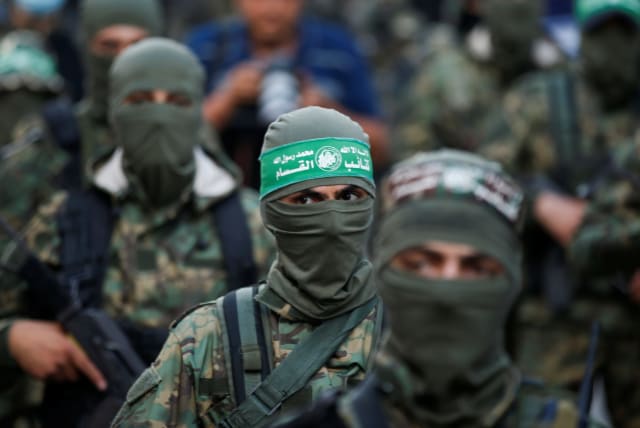Hamas claims 'flexibility' and attacks in Gaza amid talks - analysis

Hamas appears to be coordinating with other groups to target the Netzarim corridor, pro-Iran media claims.
Palestinian terrorist groups in Gaza are putting out two messages to the media amid ongoing talk of a ceasefire and a hostage deal. One narrative is that Hamas is being very flexible in its discussions with Israel. In addition, Hamas and other terrorist groups continue to say they are keeping up attacks and pressure on Israel. This multi-pronged approach is how they seek to spin the narrative that they are winning. They expect international pressure, and their backers in Iran, Turkey and other countries to help them get to the proverbial end zone in any deal with Israel.
Toward that end, the pro-Iran al-Mayadeen media included three reports on what Hamas is up to in Gaza on May 4. The first report claimed Hamas was being flexible in deal-making and that it was considering a deal in Cairo. Hamas leaders are hosted in Qatar. Egypt has been hosting talks about a potential ceasefire and hostage deal. Egypt’s foreign minister was in Gambia on Saturday for meetings of the 15th Summit of the Organization of Islamic Cooperation and he met with his Iranian counterpart. Iran wants to increase pressure on Israel and isolate Israel. It is not clear if Iran’s moves at the OIC could impact the potential deal.
Hamas confirmed the “positive” developments in Cairo, the reports at Al-Mayadeen said. This indicates that the terrorist group wants the region to know it is being flexible.
National National Resistance Brigades claims it carried out attacks
At the same time, a number of other terrorist groups in Gaza have increased their attacks on the Netzarim corridor, the only major area the IDF continues to control in Gaza. According to Al-Mayadeen, Hamas’s Izzadin al-Qassam Brigades targeted an IDF position while the al-Aqsa Martyrs Brigades targeted a “supply line” in the same area. The Netzarim corridor connects Israel with the coast, cutting off Gaza City from central Gaza. Meanwhile, the National Resistance Brigades, which are part of the Democratic Front for the Liberation of Palestine, said they also carried out attacks. The reports seem to indicate that Hamas is increasing its terrorist capabilities after six months of war. The group also claimed to target Kibbutz Nirim with rockets. The various terrorist groups say they are using mortars and other munitions to target the IDF in Gaza.
This is a new type of war. They appear to be entrenching and using standoff weapons and indirect fire, hoping to create a war of attrition against the corridor. The corridor is currently held by the 99th Division after the Nahal Brigade was withdrawn last month. It is an important tactical achievement for Israel to control the area.
Hamas is also gambling on internal Israeli divisions to prevent an operation in Rafah. This comes after two months of Israeli leaders saying they will eventually operate there. Hamas is trying to call Israel’s bluff. In addition to the pro-Iran reports that paint Hamas as “flexible” and also coordinating attacks with other units in Gaza, Al-Ain media in the Gulf is discussing Israeli internal “confusion” over the next steps in Gaza.
Israel’s friends in the Gulf likely are concerned that Israel cannot defeat Hamas fast enough and that the war has dragged on for almost seven months without clear results, with no day-after plan, and no end in sight. Al-Ain media is also reporting on what it says are revelations of a “hidden” agenda in Israel to keep Hamas in power.
This is concerning because it shows Gulf media in the UAE is now taking an increasingly skeptical stance about Israel’s stated war aims. Israel claims it wants to defeat Hamas and free the hostages. However, the reports are increasingly looking at this with skepticism, sometimes quoting Israeli media to bolster their claims.
They wonder if Israel is purposely prolonging the war for domestic political reasons. If so, the calculations at meetings like the OIC, where Iran is conducting a full court press by meeting the Egyptians and Saudis, could work in Iran’s favor, if countries naturally predisposed to work with Israel are skeptical of Israel’s goals and claims about Gaza. This is where the war now stands with many balls in the air and a lot of concern in the region about the next step.
Hamas is emboldened. It appears to be coordinating closely with a myriad of other groups in Gaza now, which is part of the collaboration that goes back many years and was operationalized on October 6. Hamas is not sitting still.
Hamas appears to be trying to increasingly steal aid entering northern Gaza. In other cases, it controls aid and may be profiting from it, and from the suffering in Gaza by diverting aid. This shows that it is still in control, even if it has lost many capabilities regarding rocket fire. Hamas is rebuilding its terrorist infrastructure.
The IDF said that there was a launch from Gaza of a rocket toward Kibbutz Ein Hashlosha. Hamas is attempting to show it can still strike at Israel despite seven months of war.
Jerusalem Post Store
`; document.getElementById("linkPremium").innerHTML = cont; var divWithLink = document.getElementById("premium-link"); if (divWithLink !== null && divWithLink !== 'undefined') { divWithLink.style.border = "solid 1px #cb0f3e"; divWithLink.style.textAlign = "center"; divWithLink.style.marginBottom = "15px"; divWithLink.style.marginTop = "15px"; divWithLink.style.width = "100%"; divWithLink.style.backgroundColor = "#122952"; divWithLink.style.color = "#ffffff"; divWithLink.style.lineHeight = "1.5"; } } (function (v, i) { });

